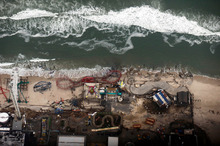The US Presidential Election Lacks a Deep Discussion of Asia
The second televised debate on Oct. 16 saw the two candidates trading harsh words over domestic policy and international diplomacy.
These debates can have a large impact on the outcome of the election. Candidates get a chance to directly confront each other and exchange arguments on the country's most pressing issues. The debates become an exhibition of more than just the candidates' remarks. How they answer questions, their facial expressions and their ability to project the image of a leader are all put to the test.
In the first debate — which dealt primarily with domestic policy — the challenger Romney gave a dominating performance as he invoked the high unemployment rates in the U.S. as evidence of the Obama administration's "failures." Following the debate, Romney's approval ratings increased and various polls showed him overtaking President Obama.
After such a flat performance, Obama changed his tactics and attempted an aggressive counterattack against Romney in the second debate. He tried to show concern for the middle class, and may have succeeded to a certain extent.
Both candidates seemed to view this as a crucial point in winning the election. Interruptions were common as each man sought to counter the other's arguments, and the intensity was palpable as the candidates glared at each other across the stage.
Despite these intense exchanges, the debates may not have dealt with foreign policy deeply enough to satisfy viewers from Japan and around the world.
The foreign policy issues brought up during the debate centered on the Middle East, specifically on the Iranian nuclear program and the attack on the U.S. Embassy in Libya. Both candidates lost the opportunity to make any substantial comments regarding Asian diplomacy.
How the U.S. plans to handle the economic rise and accelerating military development of China is the largest foreign policy concern for Japan and various other Asian countries.
Romney's statement, “On day one, I will label China a currency manipulator," displayed a confrontational attitude. In response, Obama emphasized that “the currency’s actually gone up 11 percent since I’ve been president because we have pushed them hard. And we’ve put unprecedented trade pressure on China. That’s why exports have significantly increased under my presidency." Both of these statements are part of the typical foreign policy posturing used to win votes in a presidential campaign. Neither candidate has demonstrated a clear, comprehensive Asian foreign policy.
A lack of diplomatic experience is a particularly weak point for the challenger Romney. One example of his fundamental lack of understanding came when he referred to Japan as "a nation that suffer[ed] in decline and distress for a decade or a century." In order to dispel the criticism that he is an "unskilled diplomat," Romney needs to present a large-scale Asian policy plan based on an accurate understanding of the situation.
The final debate will be held at the end of the month. It will cover foreign policy and security. Like it or not, the U.S. plays an enormous role in maintaining order in the international community. As these two candidates vie for the right to define that role, we will wait and see if they finally give Asia the consideration it deserves.

